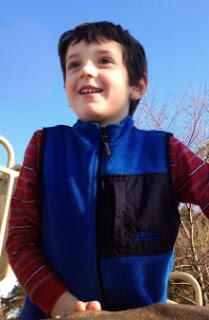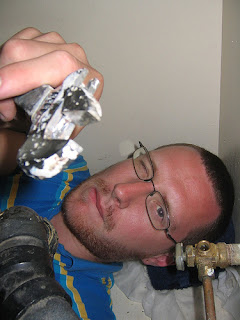.jpg) |
| Nasser, on right, with a friend |
In the 1960s, a nine-year-old boy in what
was then Ethiopia but is now Eritrea contracted measles. He recovered, but not without
consequences. He lost his sight. His name was Nasser.
Nasser's story is one of closing doors and an enormously open mind.
The Ethiopian government provided
education for the blind, but it meant Nasser had to attend school away from
home, away from the Arab Muslim traditions of his family.
While at school, he formed a friendship
with another blind student, Elfey.
The two of them became teachers.
They were sent to different villages to teach. The only way they could
be assigned to the same place was to get married. But Elfey is Christian. In spite of Nasser’s family’s objections, they married,
Nasser became a Christian, and they were assigned to schools in Addis Ababa,
away from both their families.
While in Ethiopia, Nasser joined the Ethiopian National Association for the Blind. He became an advocate for improving the
educational opportunities of students with visual limitations.
 |
| Saron, one of Erirea's chldren |
In 1991, Eritrean rebels won their
independence from Ethiopia. Since
both Nasser and Elfey had been born and raised within the boundaries of the
newly independent Eritrean country, the Ethiopians expelled them. They returned to Eritrea where they
continued teaching. They also
found their family greatly expanded as Elfey’s sister’s husband was killed during
the Civil War so she and her children needed a place to live and a source of
financial support. Elfey’s
brother-in-law fought against the Ethiopian government, but not with the
winning rebels. Instead of being
considered a martyr by the Eritrean government, he was just another dead
soldier. And his widow and children received nothing on his death.
In addition to teaching, Nasser became one
of the founders of the Eritrean National Association for the Blind, hoping to
continue the work he had begun in Ethiopia. In 2001, he was one of a group of 20 teachers, the only
non-sighted among the group, who received scholarships from the Eritrean
government to study in South Africa where he received a master’s degree in
education, with specialization in inclusive education for children with special
needs. It was a big step toward
his ultimate goal.
 |
| Tekelu, Nasser's nephew |
In 2004, Nasser returned from South Africa, when I met him during my last week in the country.
After I left, Nasser obtained funding from the U.S. Embassy to develop a
workshop for local teachers. He
was also teaching again by then, but the Eritrean government was suspicious of
his connections with the embassy.
And that developed into a combination of jealousy from his colleagues
and suspicion from his superiors.
Then, the Eritrean Association shifted its
focus to address the needs of those who lost their sight in the Civil War, not
as a result of disease. And most
of those victims are adults, not the children Nasser so desperately wanted to help. He was removed from the Board of the Association
and its committees.
Because Nasser was no longer on the Board
of the Eritrean National Association for the Blind, he lost his teaching
job. The Ministry of Education
encouraged him to look for work outside of Eritrea as they recognized they would
not be able to help him meet his goal.
So Nasser made plans to travel to Sudan to visit relatives and look for
work.
After a month in Sudan, he left, but
didn’t return to Eritrea. Instead,
he returned to Addis Ababa, by means that I have never asked him to
explain. I don’t really want to
know. His wife, Elfey, their three
children, his sister-in-law and her children, and his mother-in-law remained in
Eritrea, with only Elfey’s salary to support them, so long as she continued teaching, so long as the Eritrean government didn’t turn its suspicion in her
direction.
This is an unfinished story.
Nasser remained in Ethiopia more that two years, during which time he lived in one of the refugee camps where he would have to collect water each morning to bathe and fuel to cook his meals. After more that a year on a list with the UNHCR for resettlement in Norway, Canada, or the United States, his family still remained in Eritrea. Throughout that experience, Nasser continued to write proposals for grants to share his experience, thoughts, and theories on inclusive education for blind and deaf children. Throughout this experience, he remained positive, focused on his goals. Throughout this experience, he sought to find his own means, turning to a friend for help only when he sees no other option. And throughout this experience, he has continued to teach me the value of recognizing that when a door closes, sometimes there is a sign on it pointing to another open door with an even better prize behind it.
Nasser is now in the United States, in Syracuse, NY. His wife and children are in Ethiopia. His wife's case has been approved to join Nasser, but hls children's cases are still pending. Nasser works doing some tutoring and medical translation.
This story is unfinished. But I have no doubt that it will be a
success story.






.jpg)














